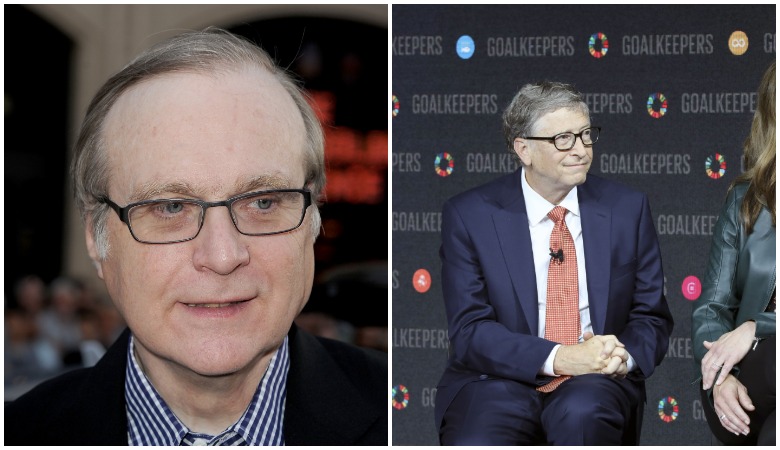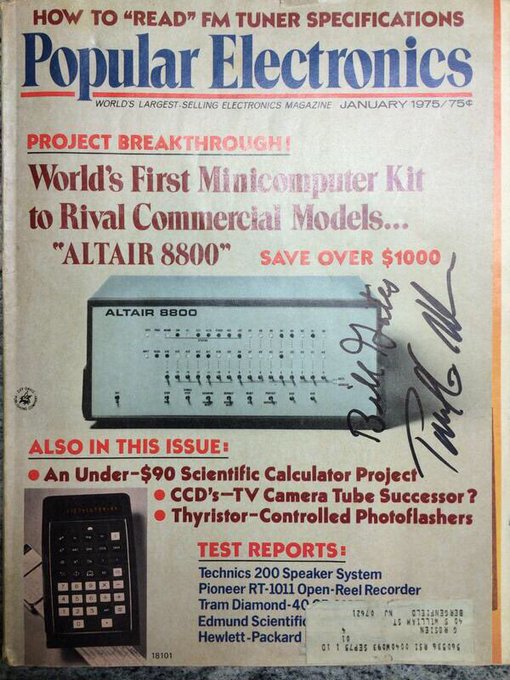
Getty Paul Allen, who co-founded Microsoft with Bill Gates, has died of non-Hodgkins lymphona. Here's what you need to know about his volatile relationship with Bill Gates.
Paul Allen, who co-founded Microsoft with Bill Gates, has died of non-Hodgkin’s lymphoma, according to a press released by Vulcan.
The statement reads, “It is with deep sadness that we announce the death of our founder Paul G. Allen, co-founder of Microsoft and noted technologist, philanthropist, community builder, conservationist, musician and supporter of the arts. Mr. Allen died on Monday afternoon, October 15, 2018, from complications of non-Hodgkin’s lymphoma in Seattle. Mr. Allen was 65 years old.”
Gates has yet to release a statement regarding Allen’s death.
Allen and Gates were known to have a competitive and often volatile relationship throughout their multiple decades of friendship and business-building. Here’s what you need to know.
1. Allen & Gates Met When They Were Teenagers & Founded Microsoft Less Than a Decade Later
According to Biography.com, Gates and Allen met as fellow students at Lakeside School, when Allen was 14 and Gates was 12.
In Allen’s memoir, he detailed what a tough negotiator Gates was from the beginning of their company’s inception, revealing that Gates suggested they split revenue 60-40 since he had done more work on the software than Allen. Later, Gates reportedly pushed for 64-36, and Allen acquiesced again.
Allen said to The Guardian of their work together, “During the founding first eight years my ideas were definitely key to the company. Bill would test my ideas. I would come to him with another 10 ideas that never went anywhere – he was the sanity check on the flow of ideas. When it came to selling and marketing and staffing and all those kinds of things, he was much more excited on the business side, so we became very complementary.”
2. In an Excerpt From His Memoir, Allen Claimed Gates Tried to Buy His Stock Out When He Quit
In his memoir, “Idea Man,” Allen revealed a series of experiences he shared with Gates, including a few not-so-flattering ones that occurred at the end of his time with Microsoft. He claimed that when he quit Microsoft, Gates tried to buy out his stock at $5 per share, and when Allen asked for $10, Gates refused. Allen then decided to keep his stock, and eventually went on to be one of the richest men in the world.
Allen also alleged that when he was sick with cancer in 1982, he overheard Gates and Steve Ballmer of Microsoft talking about his “lack of contributions” and scheming about how to dilute his equity by offering various stock options to other employees. Allen further alleged in his memoir that he eventually confronted them over this, and this was one of the driving factors that drove him to quit.
3. Allen Was the One Who Came Up With the Name ‘Micro-Soft’
In a 1995 interview with Forbes Magazine, Allen and Gates shared the derivation of the name “Microsoft”. They said,
GATES: When we signed that first contract with MITS, we referred to ourselves as “Paul Allen and Bill Gates doing business as Micro-Soft.” I don’t remember why we spelled it with a hyphen and a capital “S.” We put a credit line in the source code of our first product that said, “Micro-Soft
ALLEN: We had talked about a lot of different names back in Boston, and at some point I said, “Well, the totally obvious name would be Microsoft.”
GATES: We also had mentioned names like Outcorporated Inc. and Unlimited Ltd., but we were, you know, joking around. We talked a lot about whether we should call it Allen & Gates, but decided that was not a good idea.
ALLEN: Yeah. Because companies like DEC and IBM weren’t named after personalities, they would have a longevity and identity way beyond the founders…
GATES: …and it seemed like a law firm or like a consulting company to call it Allen & Gates. So we picked Microsoft even before we had a company to name.
Later on in the interview, Allen said, “Our management style was a little loose in the beginning. We both took part in every decision, and it’s hard to remember who did what. If there was a difference between our roles, I was probably the one always pushing a little bit in terms of new technology and new products, and Bill was more interested in doing negotiations and contracts and business deals.”
Gates added, “We learned a lot of things as we went: Okay, we have to hire people; so what do we do? Okay, we’re going to rent space; how do we do that? Okay, we’re going to do contracts with people now; I’d get advice from my dad [a prominent Seattle attorney].”
You can read the full transcript from the Forbes interview here.
4. Gates & Allen Had Their Own Secret Language & Both Were Known for Having Odd Tics & Habits
As The Guardian notes, both Gates and Allen were known for being a little bit “odd,” and even had their own special language that they shared while working on Microsoft. For example, they described their work-centric conversations as “popping up the stack” when they started to get hot on an idea. This phrase mean that they would quickly jump from one topic of conversation to another, in a fashion that made it very difficult for anyone else to keep up or understand.
5. Allen Described His Relationship With Gates as a ‘Failed Romance’, But Insisted His Memoir Was Not Fueled by Bitterness
Allen has maintained that he didn’t write his memoir, “Idea Man,” out of bitterness, even though it paints his old business partner in a very harsh light. To The Guardian, he said, “I don’t think the book is bitter at all. I think it’s a direct telling of what happened, and tries to give you a real feel of the personalities involved.”
He added, “After a few years all that [drama] passes. Bill and I have always been friends, even through the ups and downs, and there have been some. Those events were in 1982, there’s been a lot of water under the bridge since then.”
To The New York Times, Allen reiterated, “I just think this is my side of the story told in an unvarnished, warts-and-all way.”

